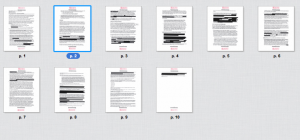How long can the Democratic public counter-memorandum remain redacted?
Posted By Cliff Tuttle | February 25, 2018
No. 1,428
The whole point of intelligence/counter-intelligence is obtaining secret information and keeping it secret. In an effort to rebut a prior (unreacted) memo released by Chairman Nunes of the House Intelligence Committee, the minority (pronounced Democrats) released a response which the White House would not approve, for National Security reasons, without serious redaction. The graphic above shows the extent of the editing. If you want to read the memo in its current redacted form, its not hard to find. It made all of the papers.
Yet, it wasn’t too long ago that the word “redaction” was one of those words in the active vocabulary of lawyers and the government wonks only. Thanks to the Russian interference investigations, it has now entered the general parlance. But was it really such a good idea to release such a document at all? Even with redactions?
How long before the fully un-redacted version makes it to the front page of the Washington Post or the New York Times? Such copies exist, of course. Who knows who has them? Russian agents, maybe? Did we already forget how all those emails from the 2016 campaign became public? This is the age of Wikileaks, you know. And before then, the Pentagon Papers. Today, the whole world is porous.
This is a made-to-order opportunity to use one of my favorite Benjamin Franklin quotes. Franklin, as we all know, was dispatched by the Continental Congress to obtain the military and financial support of the King of France for our Revolution. Lots of top-secret stuff passed through his hands. The Brits spied on his activities continuously. In their dispatches to London he was cryptically known as “78.” While Franklin lived long before electronic media, he knew a lot about human nature.
Franklin said: “Three men can keep a secret if two of them are dead.”
The question is not whether the words behind those black panels will be leaked. The question is: “How long?”




